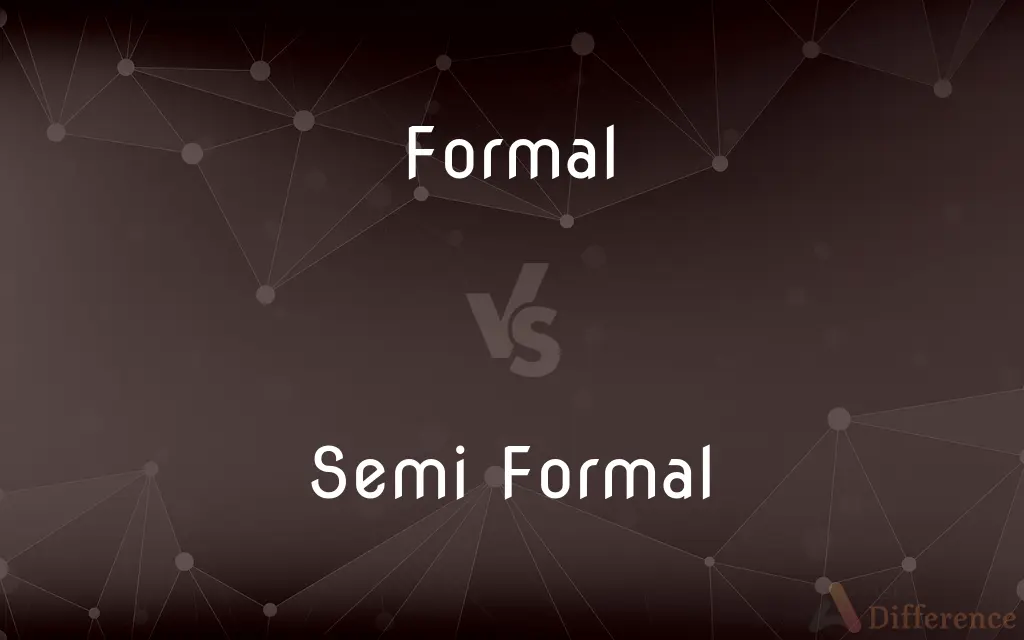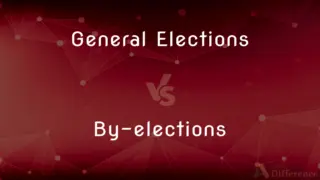Formal vs. Semi Formal — What's the Difference?
By Tayyaba Rehman — Published on October 23, 2023
Formal refers to adhering to established conventions or rules, often associated with official or ceremonial occasions. Semi-formal indicates a less strict or official but still organized and respectable manner or dress code.

Difference Between Formal and Semi Formal
Table of Contents
ADVERTISEMENT
Key Differences
Formal, in general contexts, implies adherence to a defined set of standards or rules, whether in attire, writing, or events. Semi-formal, on the other hand, navigates a middle path, offering a somewhat relaxed adherence to official standards, often allowing for a wider range of acceptable behaviors or attire.
In the context of attire, Formal wear generally dictates a strict dress code that includes tuxedos for men and evening gowns for women. Semi-formal, however, can allow for a wider variety in outfit choices, like cocktail dresses for women and dark suits for men, providing a slightly less rigid framework.
Formal writing or communication employs strict adherence to grammatical rules, professional tone, and often avoids the use of contractions or colloquial language. In contrast, Semi-formal writing might permit a more conversational tone, allowing for a friendlier and more approachable manner while maintaining professionalism.
When organizing or attending events, Formal occasions demand a stringent observance of etiquettes and protocols, ensuring every detail aligns with predetermined norms. Semi-formal events, while maintaining a degree of formality, may allow for more flexibility in aspects like decor, agenda, and guest interactions.
Formal and Semi-formal also reflect societal norms and expectations, where Formal symbolizes utmost respect and seriousness towards an occasion or interaction. Semi-formal suggests a balanced approach, wherein respect and adherence to norms are preserved but executed in a slightly more relaxed and accessible manner.
ADVERTISEMENT
Comparison Chart
Attire
Strict dress code: tuxedos, evening gowns.
Relaxed dress code: dark suits, cocktail dresses.
Tone in Communication
Professional, avoids contractions, colloquial language.
Friendlier, may allow contractions, slightly colloquial.
Event Etiquette
Stringent observance of etiquettes and protocols.
Offers flexibility in etiquettes and interactions.
Writing Style
Adheres strictly to grammatical and structural rules.
Allows for a more conversational tone, yet professional.
Social Implications
Symbolizes utmost respect and seriousness.
Maintains respect while being more accessible and relaxed.
Compare with Definitions
Formal
Formal refers to adhering strictly to traditional rules or styles.
The Formal event required black-tie attire.
Semi Formal
In communication, Semi Formal balances professionalism and approachability.
The Semi Formal letter was friendly yet respectful.
Formal
It can denote a type of organized, official event.
Invitations were sent out for the Formal inauguration.
Semi Formal
Semi Formal indicates a partially formal style or manner.
The Semi Formal event allowed for a range of dress options.
Formal
Formal language follows strict grammatical rules.
His Formal speech was polished and proficient.
Semi Formal
Semi Formal attire is dressy but allows for some variance.
Cocktail dresses are appropriate for a Semi Formal occasion.
Formal
In attire, Formal typically indicates a very dressy code.
She chose a floor-length gown for the Formal dinner.
Semi Formal
Semi Formal events maintain some formal aspects but are generally more accessible.
The Semi Formal gala facilitated both networking and casual conversations.
Formal
Formal can also imply seriousness or solemnity.
The meeting took on a Formal tone as the news was shared.
Semi Formal
It suggests relaxed official standards while retaining respectability.
His Semi Formal approach made clients feel at ease.
Formal
Relating to or involving outward form or structure, often in contrast to content or meaning.
Semi Formal
Moderately formal; requiring a dinner jacket;
He wore semiformal attire
A black-tie dinner
Formal
Being or relating to essential form or constitution
A formal principle.
Formal
Following or being in accord with accepted or prescribed forms, conventions, or regulations
Had little formal education.
Went to a formal party.
Formal
Characterized by strict or meticulous observation of forms; methodical
Very formal in their business transactions.
Formal
Stiffly ceremonious
A formal greeting.
Formal
Characterized by technical or polysyllabic vocabulary, complex sentence structure, and explicit transitions; not colloquial or informal
Formal discourse.
Formal
Having the outward appearance but lacking in substance
A formal requirement that is usually ignored.
Formal
Something, such as a gown or social affair, that is formal in nature.
Formal
Being in accord with established forms.
She spoke formal English, without any dialect.
Formal
Official.
I'd like to make a formal complaint.
Despite efforts by limnologists and freshwater biologists to create a formal definition of “pond”, there is still no universal distinction between a “pond” and a “lake.”
Formal
Relating to the form or structure of something.
Formal linguistics ignores the vocabulary of languages and focuses solely on their grammar.
Formal
Relating to formation.
The formal stage is a critical part of any child's development.
Formal
Ceremonial or traditional.
Formal wear must be worn at my wedding!
Formal
Proper, according to strict etiquette; not casual.
He's always very formal, and I wish he'd relax a bit.
Formal
Organized; well-structured and planned.
When they became a formal club the rowers built a small boathouse.
Formal
(mathematics) Relating to mere manipulation and construction of strings of symbols, without regard to their meaning.
Formal series are defined without any reference to convergence.
Formal
(clothing) An evening gown.
Formal
An event with a formal dress code.
Jenny took Sam to her Year 12 formal.
Formal
(programming) A formal parameter.
Formal
(Oxbridge slang) formal hall.
Formal
(uncountable) Formalin.
Formal
An acetal formed from formaldehyde.
Formal
See Methylal.
Formal
Belonging to the form, shape, frame, external appearance, or organization of a thing.
Formal
Belonging to the constitution of a thing, as distinguished from the matter composing it; having the power of making a thing what it is; constituent; essential; pertaining to or depending on the forms, so called, of the human intellect.
Of [the sounds represented by] letters, the material part is breath and voice; the formal is constituted by the motion and figure of the organs of speech.
Formal
Done in due form, or with solemnity; according to regular method; not incidental, sudden or irregular; express; as, he gave his formal consent.
His obscure funeral . . . No noble rite nor formal ostentation.
Formal
Devoted to, or done in accordance with, forms or rules; punctilious; regular; orderly; methodical; of a prescribed form; exact; prim; stiff; ceremonious; as, a man formal in his dress, his gait, his conversation.
A cold-looking, formal garden, cut into angles and rhomboids.
She took off the formal cap that confined her hair.
Formal
Having the form or appearance without the substance or essence; external; as, formal duty; formal worship; formal courtesy, etc.
Formal
Dependent in form; conventional.
Still in constraint your suffering sex remains,Or bound in formal or in real chains.
Formal
Sound; normal.
To make of him a formal man again.
Formal
Being in accord with established forms and conventions and requirements (as e.g. of formal dress);
Pay one's formal respects
Formal dress
A formal ball
The requirement was only formal and often ignored
A formal education
Formal
Characteristic of or befitting a person in authority;
Formal duties
An official banquet
Formal
(of spoken and written language) adhering to traditional standards of correctness and without casual, contracted, and colloquial forms;
The paper was written in formal English
Formal
Represented in simplified or symbolic form
Formal
Logically deductive;
Formal proof
Formal
Refined or imposing in manner or appearance; befitting a royal court;
A courtly gentleman
Common Curiosities
What is a Semi Formal event like?
Semi Formal events maintain a level of formality but offer more relaxed and flexible guidelines for things like attire and etiquette.
What is a defining characteristic of Formal communication?
Formal communication typically adheres strictly to grammatical and etiquette rules.
In what scenarios is Formal attire required?
Formal attire might be required for black-tie events, official ceremonies, or formal dinners.
Can Semi Formal attire include jeans?
Generally, Semi Formal attire doesn't include jeans and leans towards dressier outfits like suits or dresses.
When might Formal language be required?
Formal language is often required in academic, legal, and official communications or documents.
Can you use contractions in Formal writing?
Contractions are typically avoided in Formal writing to maintain a professional tone.
Is a cocktail dress considered Semi Formal?
Yes, cocktail dresses are often suitable for Semi Formal occasions.
Are formalities necessary in all business settings?
While many business settings adhere to Formal norms, the degree of formality can vary depending on the company culture and context.
Can Semi Formal writing use first-person narration?
Semi Formal writing may use first-person narration, blending professionalism with a conversational tone.
How does Formal education differ from informal?
Formal education is systematically structured and officially recognized, unlike informal education, which is less structured.
What does Semi Formal mean in invitations?
Semi Formal in invitations implies a respectable but not overly strict dress code and atmosphere.
How does Semi Formal decor differ from Formal decor?
Semi Formal decor combines elegance with ease, whereas Formal decor adheres to classical and often luxurious standards.
Can a Semi Formal event become Formal?
While there may be flexibility, a Semi Formal event generally maintains its stated level of formality and doesn’t become Formal.
Is Formality valued in all cultures equally?
Different cultures have varying perspectives on the importance and expression of Formality.
Can Formal events be casual?
Formal events typically maintain a high degree of solemnity and adherence to traditional norms and are not considered casual.
Share Your Discovery
Previous Comparison
7Up vs. Sprite
Next Comparison
General Elections vs. By-electionsAuthor Spotlight
Written by
Tayyaba RehmanTayyaba Rehman is a distinguished writer, currently serving as a primary contributor to askdifference.com. As a researcher in semantics and etymology, Tayyaba's passion for the complexity of languages and their distinctions has found a perfect home on the platform. Tayyaba delves into the intricacies of language, distinguishing between commonly confused words and phrases, thereby providing clarity for readers worldwide.












































